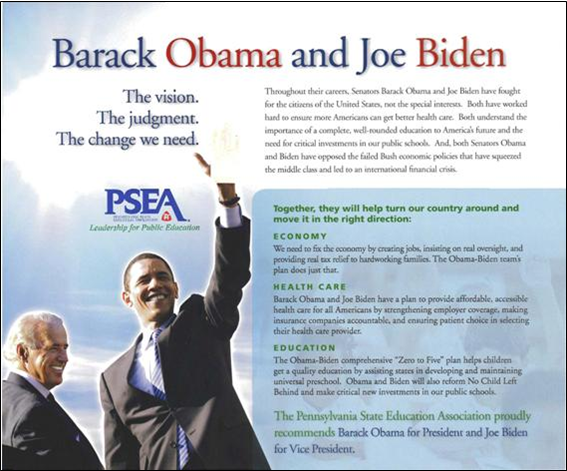Fact Sheet

Government Unions’ Political Spending
Summary
- Currently, state and local governments, including school districts, use taxpayer-funded payroll systems and public employee time to collect union campaign contributions to candidates as well as union membership dues, a portion of which is used for political activity.
- Government unions spend dues money on a variety of political activities, including get-out-the-vote drives, election mailers in support of candidates, lobbying of legislators, TV and radio ads, and fundraising for political action committees (PACs).
- It is a crime for politicians to use public resources for politics, and the law should be extended to government unions that engage in the same practice. Taxpayer resources should never be used to support partisan politics.
Government Union Dues and Campaign Contributions Are Collected at Taxpayers’ Expense
- There are real costs to taxpayer collection of dues and campaign contributions, a political privilege for which only government unions are afforded.
- For example, officials in Blair County report that one payroll employee devotes a full day's work every two weeks to calculating deductions for union dues.
- This equates to 24 work days per year or a full month of work, costing taxpayers thousands of dollars.
- Former state lawmakers like John Perzel and Mike Veon went to prison for using staff and government computer systems to support political campaigns, yet government union leaders are permitted to use public resources for politics.
Pennsylvania’s Government Unions Use Dues For Politics
- Pennsylvania’s five largest government unions—PSEA, AFSCME Council 13, SEIU, UFCW 1776, and the PFT—received more than $163 million in revenue last year, mostly collected through automatic deduction of union dues at taxpayer expense.
- These unions reported spending more than $5.5 million in dues on lobbying and political activity in 2013.
- As required by law, the PSEA informed its members that 12% of their dues will be dedicated to political activities and lobbying in their 2013-2014 membership year.
| Government Union Profiles, 2013 | |||||
| PSEA | AFSCME Council 13 | UFCW 1776 | SEIU Local 668 | PFT | |
| Members and Fee Payers | 186,578 | 61,201 | 20,618 | 19,752 | 30,916 |
| Total Revenue | $93,727,932 | $36,426,767 | $16,637,558 | $14,411,912 | $2,362,131 |
| Political Activity & Lobbying | $3,764,154 | $813,659 | $454,048 | $376,699 | $116,982 |
| Chief Executive | Michael Crossey | David Fillman | Wendell Young, IV | Kathy Jellison | Theodore Kirsch |
| CEO/Pres. Compensation | $223,850 | $205,210 | $292,765 | $101,571 | $172,806 |
| Regular Dues for Full Time Member | $489/year | 1.5% of salary | $16.97/week | 1.39% of salary | $10.30/month |
| Sources: Office of Labor-Management Standards, “Form LM-2 Labor Organization Annual Reports,” http://kcerds.dol-esa.gov/query/getOrgQry.do | |||||
Government Unions Use Dues For Politics
- Government unions spend dues money on mailers in support of candidates, lobbying, and TV and radio ads.
- The PSEA sent mailers to Pennsylvania voters endorsing Barack Obama (pictured), newsletters mocking Governor Corbett to fundraise for its PAC, and sent funds to support the recall of Wisconsin Gov. Scott Walker.

- The NEA and SEIU used membership dues to lobby and advocate for ObamaCare, a law which has resulted in millions of Americans losing their insurance coverage.
- UFCW 1776 claimed to spend $1 million on TV ads opposing liquor store privatization, including one falsely claiming liquor privatization will cause more drunk driving deaths.
- Union dues are also funneled to other political entities that engage in lobbying and partisan activities. Union dues fund a variety of political advocacy organizations, including the Keystone Research Center, Keystone Progress, the CLEAR Coalition for lobbying, Planned Parenthood, and others.
- A recent federal court ruling allows a new “Super PAC” to operate in Pennsylvania and collect unlimited contributions from union dues. The Super PAC can’t give directly to candidates but intends to run independent ads supporting and opposing candidates for offices.
- The PSEA sent mailers to Pennsylvania voters endorsing Barack Obama (pictured), newsletters mocking Governor Corbett to fundraise for its PAC, and sent funds to support the recall of Wisconsin Gov. Scott Walker.
Union Campaign Contributions are Collected Using the Same System
- Unions use taxpayer resources to collect members’ voluntary PAC contributions for candidates.
Total PAC Revenue 2011-2012
Union
2011
2012
Total
PSEA
$1,221,866
$1,127,221
$2,349,087
PFT
$240,411
$229,350
$469,761
AFSCME Council 13
$413,971
$639,722
$1,053,693
SEIU Local 668
$172,455
$149,299
$321,754
UFCW 1776
$158,391
$166,534
$324,925
Pennsylvania AFL-CIO
$35,542
$147,400
$182,942
Total
$2,242,636
$2,459,526
$4,702,162
- While unions cannot use their members’ dues to donate directly to candidates, PACs can make direct campaign contributions.
- PAC revenue from just six of Pennsylvania’s largest government unions totaled more than $4.7 million in the last election cycle.
Paycheck Protection: Ending an Unfair Practice
- Paycheck protection would end taxpayer-financed collection of dues, fees and PAC money. Unions—not taxpayers—should be responsible for collecting member dues, fees and PAC money.
- Paycheck protection would not prevent unions from engaging in the political process.
- Neither union members nor taxpayers should be forced to subsidize candidates, political activity, or lobbying efforts.
Topics on this page
PennsylvaniaPennsylvania State Education AssociationBarack ObamaAffordable Care ActAmerican Federation of State, County and Municipal EmployeesService Employees International UnionAmericansWisconsinPolitical action committeeAFL–CIOMike VeonJohn PerzelUFCW Local 1776Wendell YoungTrade unionPlanned ParenthoodScott WalkerBlair CountyOffice of Labor-Management StandardsUnion dues